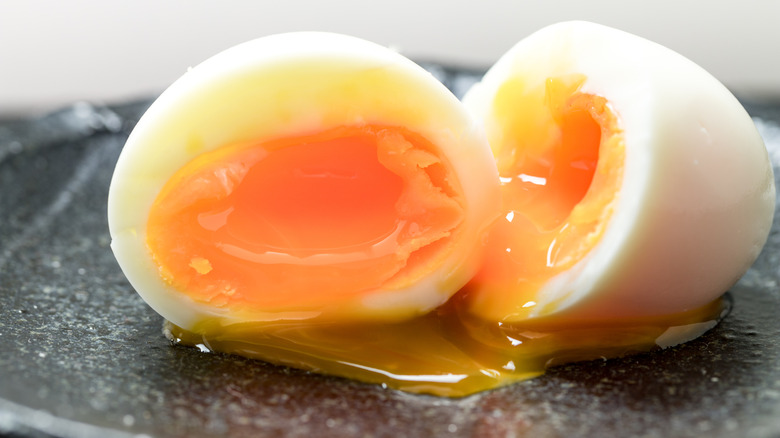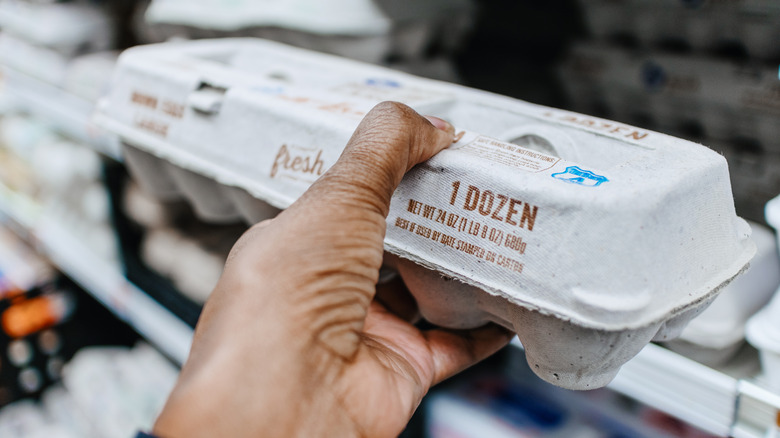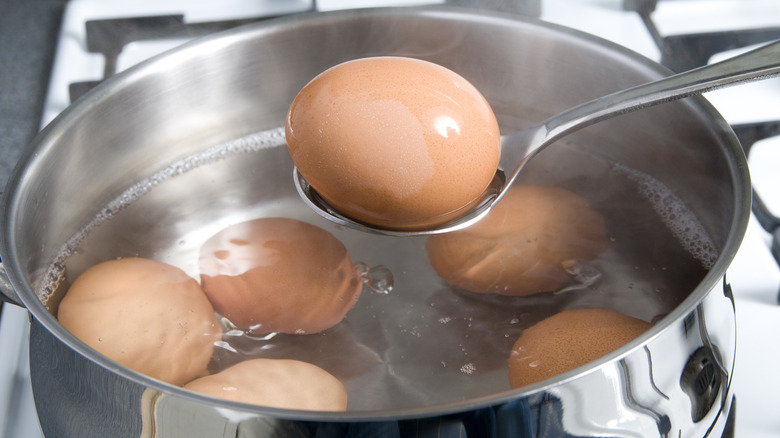How To Perfect A Soft Boiled Egg
We may receive a commission on purchases made from links.
Soft-boiled eggs may not be something you'll see on the menu at your favorite breakfast restaurant, where fried and scrambled hold sway, but they can be tasty with toast or topping a bowl of ramen. Nelson Serrano-Bahri, who works for the American Egg Board as a chef and director of innovation, says that the perfect soft-boiled egg needs a white that is tender, yet fully set (uncooked whites are the worst), with a warm, slightly runny yolk. As he describes such an egg, "It should taste deeply eggy and fresh, with a buttery richness that coats your mouth. The feel should be delicate but satisfying, offering a gentle contrast between the softly set white and the molten yolk." To achieve such an egg, though, you'll need to keep an eye on the time as it cooks.
Serrano-Bahri feels that overcooking soft-boiled eggs is probably the biggest mistake people make with them. Soft boiled eggs require anywhere from four to six minutes of cooking time, while if you run over and cook them between seven and nine minutes, what you've got is an egg that's medium-boiled. Anything over that, and you're looking at hard-boiled. "Make sure you time the cooking process correctly to avoid under or over cooking," says Serrano-Bahri. Luckily, you probably have a timer function on your smartphone, or you can go old-school with a piece of kitchen kitsch like these cute Toforevo chicken-shaped egg timers (a pair is selling on Amazon for $6.29).
Choose your eggs wisely for soft-boiling
According to Nelson Serrano-Bahri, "Very fresh eggs generally give the best results for a soft boil." While he might prefer newly laid ones for their flavor, he admits that eggs aged between five and seven days won't be so hard to peel, seeing them as an acceptable compromise. Even older eggs will be the easiest peelers, however, since their shells have a higher pH level and are less likely to stick to the cooked albumen.
The age of your eggs may be a moot point, however, even if you buy them from a farmer's market. These markets, just like farm-to-table restaurants, have been known to fib about their products' provenance. Farm-fresh eggs are generally safe to eat, but they may not have been born yesterday, and unless you were too, don't take everything at face value.
Eggs purchased from the supermarket could be up to two months old, but each carton is labeled with a number representing the day they were packed. If your carton is marked 32, for example, that means the eggs date back to February 1, the 32nd day of the year. The supermarket supply chain being what it is, you may not be able to find week-old eggs, but you can at least ensure that the eggs you have are okay to eat by immersing them in a glass of water. Eggs that sink are fairly fresh, but eggs that float may not be.
Cooking and cooling soft-boiled eggs
Nelson Serrano-Bahri advises starting with cold water when making soft-boiled eggs. Put the eggs in the pot, crank up the heat, and watch for the water to reach a rolling boil. Once it does, immediately lower the heat to a simmer and begin the four to six-minute countdown. Four minutes will result in super-soft yolks, while six-minute eggs will be firmer.
While the eggs are simmering, prepare a bowl of ice cubes covered with water. As soon as the eggs are done, remove them from the water using tongs, a slotted spoon, a spider, or any other utensil that allows you to pick them up quickly and gently without burning your fingers. Soft-boiled eggs only need three to five minutes of cooling time. "You will be able to tell when the eggs are ready when more than half of the ice has fully melted," said Serrano-Bahri, adding, "That will indicate that the eggs are at a safe temperature to peel."
Serrano-Bahri also offered an alternate way of preparing "soft-boiled" eggs, telling us they can be baked in an air fryer. At 350 to 400 degrees Fahrenheit, 10 minutes of cooking time will yield a soft-set yolk, while 17 minutes make for a hard one. Whichever way you cook your eggs, eat them right away or store them in the refrigerator. As per Serrano-Bahri, refrigerated soft-boiled eggs are only good for two days, a marked contrast to the hard-boiled kind, since the USDA says those can last up to a week.


